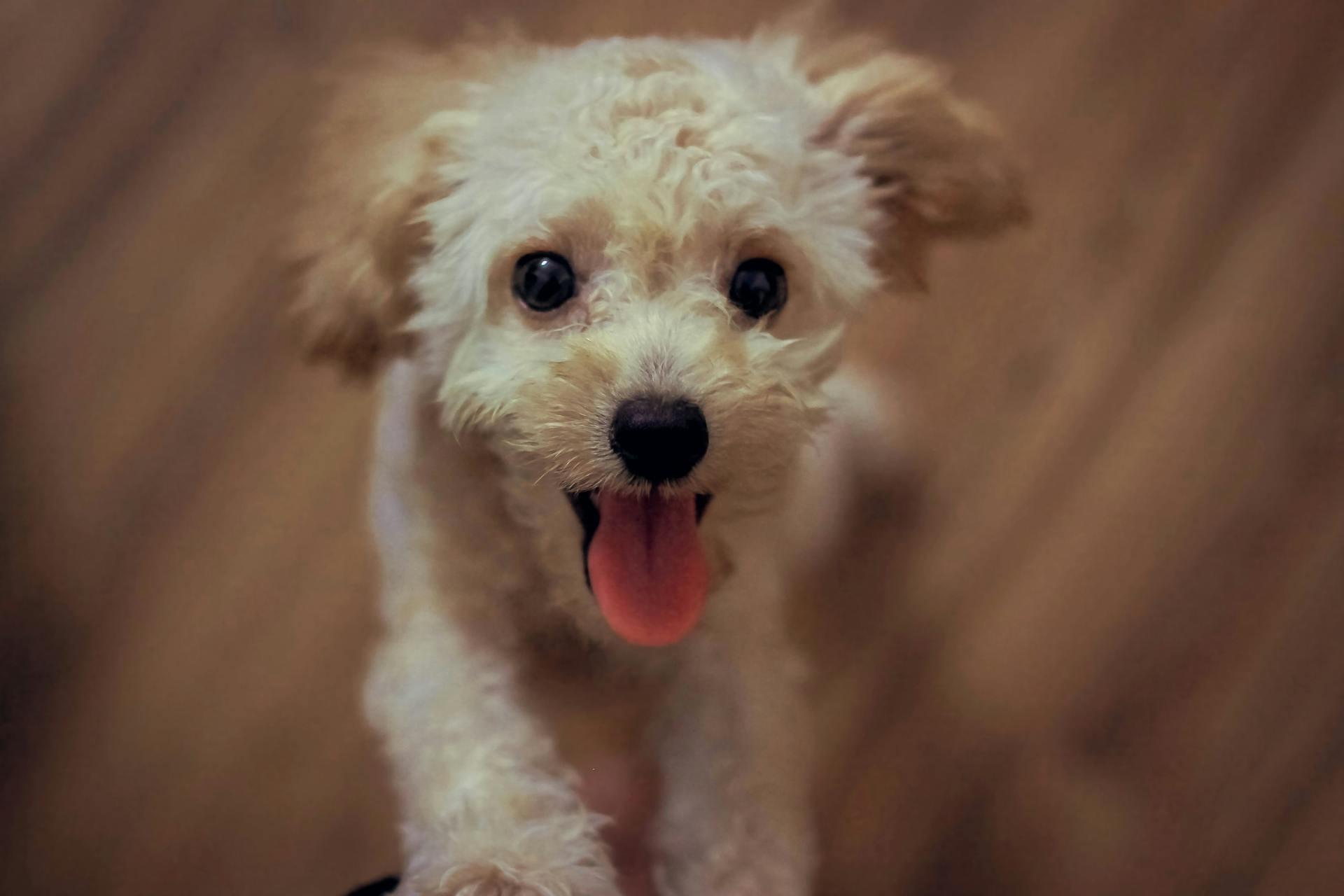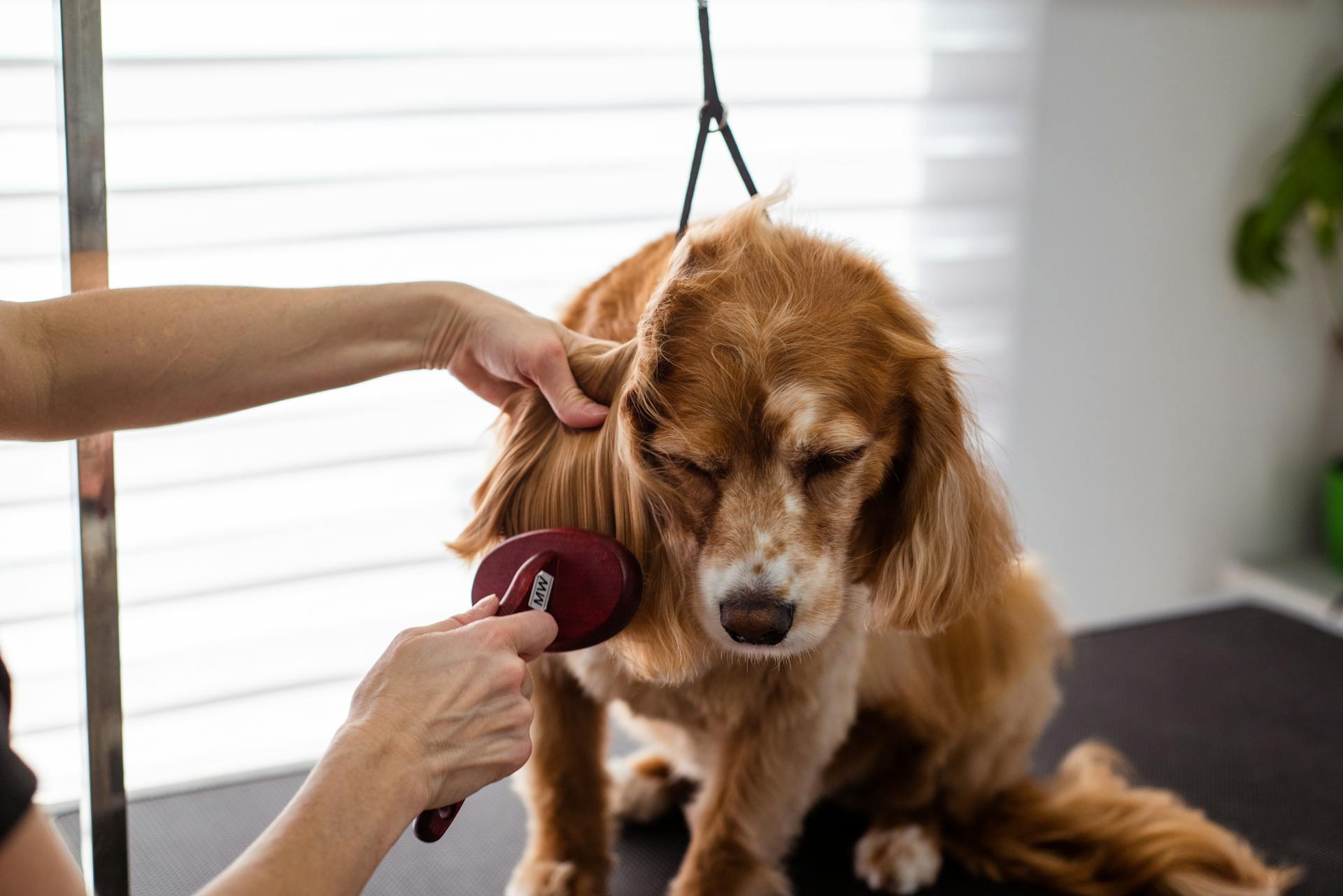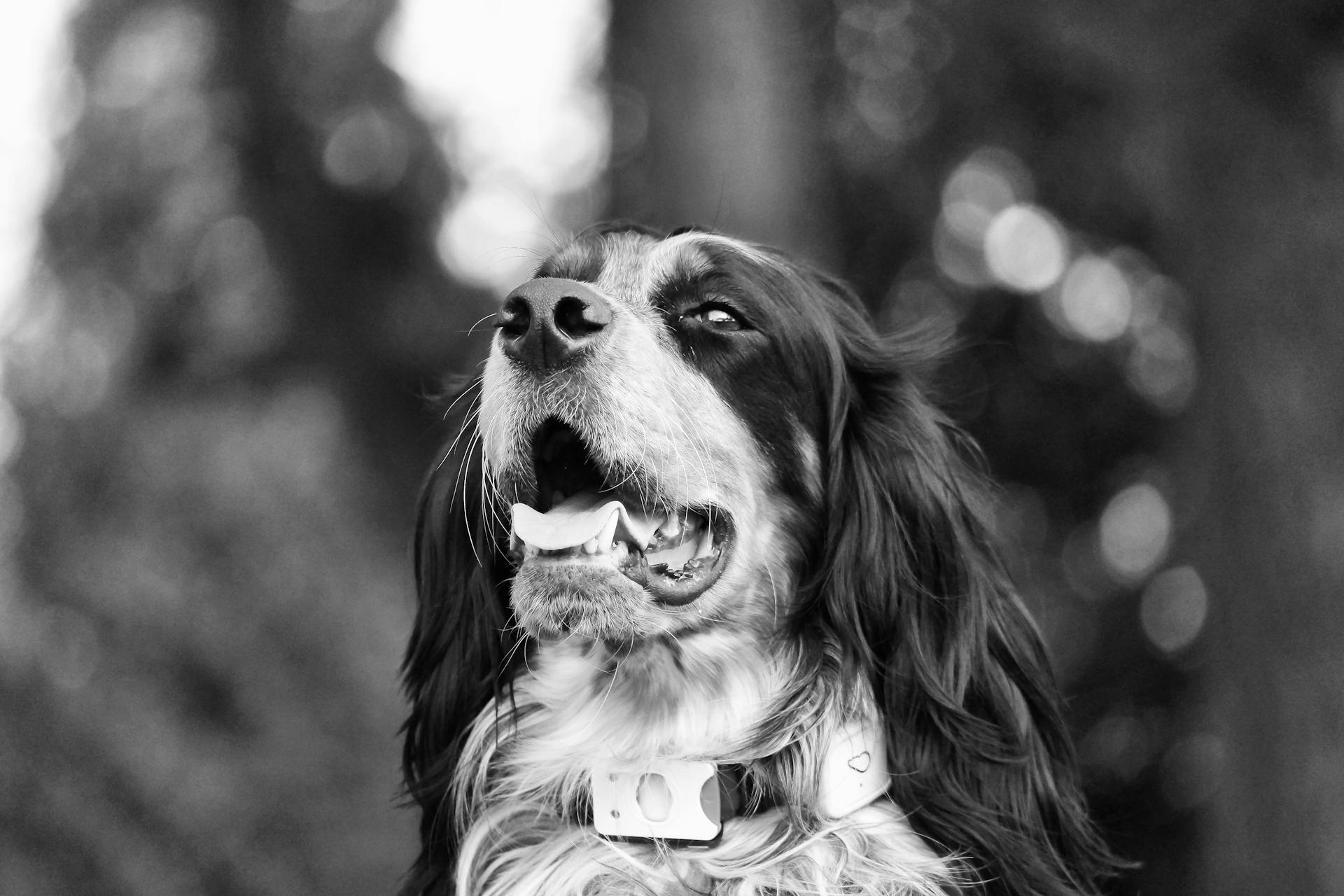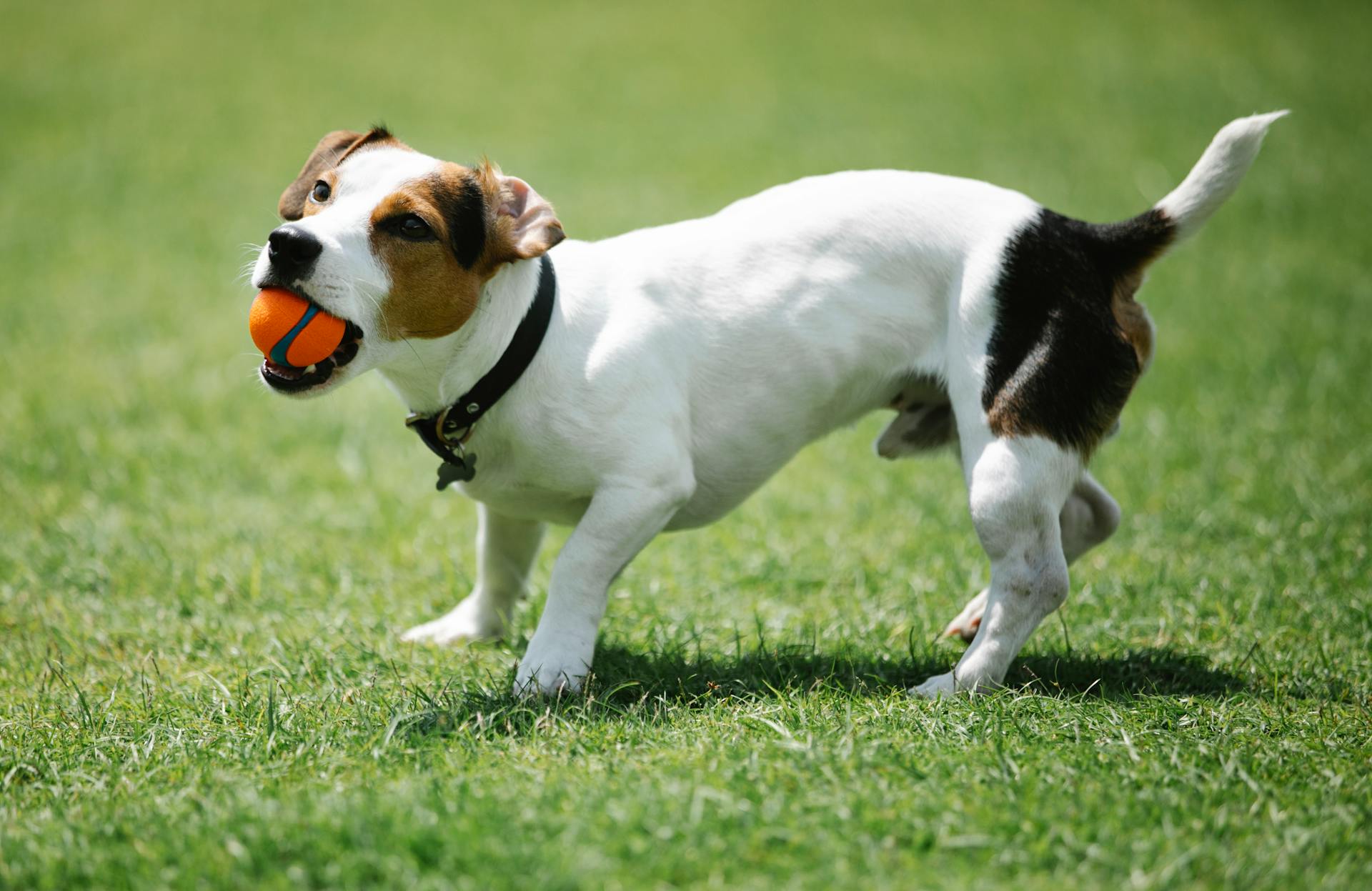
Caring for a Cavachon Poodle requires attention to its grooming needs. They shed minimally, but their coats still require regular brushing to prevent matting.
To keep your Cavachon Poodle's coat in top condition, brush them at least 3-4 times a week, paying extra attention to areas prone to matting.
Physical Characteristics
The cavachon poodle is a small dog with a big personality. They typically stand between 11-13 inches tall at the shoulder.
Their weight varies slightly depending on whether they're male or female. Female cavachon poodles usually weigh between 9-14 pounds, while males weigh between 12-16 pounds.
Their coats are one of their most distinctive features. You can expect a combination of brown, white, and black fur with brown eyes. Some cavachon poodles may also have a variety of coat patterns and colors, including red, cream, white, apricot, and pied.
Their coats are typically silky, medium in length, and have a varied level of wave or curl. They shed very little, but require frequent grooming due to their fine coat growing out.
Here's a breakdown of the average size of a cavachon poodle:
Temperament
Cavachons are very loyal dogs, always eager to please their owners.
Their playful nature makes them a joy to be around, especially as puppies. They love to run around and play, but they also make fantastic lap dogs and cuddle buddies.
Cavachons are easy to train, especially when it comes to simple commands and tricks. However, they do require proper socialization and training to ensure they're comfortable around strangers and new environments.
These dogs are extremely friendly and sociable, loving nothing more than being around people and other animals. They make great family pets, getting along well with children and other pets.
Cavachons form strong bonds with their owners, loving nothing more than being by their side. This can sometimes lead to separation anxiety if left alone for too long.
Their calm and easygoing nature makes them an excellent choice for people of all ages. They're not prone to excessive barking or hyperactivity, content to relax and enjoy the company of their owners.
Explore further: Pug Dog Behavior
Care and Maintenance
Cavachon poodles require regular grooming appointments every two to three months to keep their coat in check.
They need their hair around their eyes kept short to prevent buildup, and owners should regularly clean beneath their eyes with a warm washcloth or tear-stain wipes.
A half-hour walk is usually enough exercise for Cavachons, but they're generally very active and playful, so don't be surprised if they're up for more.
Positive reinforcement training is the best approach for any dog, and it's essential to start behavior training with Cavachons when they're young.
Cavachons are highly adaptable to all environments, whether it's a big home or small apartment, and they don't require a large outdoor space for activity.
They love the company of others and don't prefer to be alone, making them great family dogs and wonderful companions for young children.
Cavachons are extremely social and can get along with pet siblings with proper introductions and training, but young children should be taught not to pick them up on their own.
Regular brushing is crucial to prevent matting and knotting of their curly coat, and gentle daily brushing can help keep their coat shiny and healthy.
After wet and muddy walks, they should be given a good rinse with warm water, and bathing doesn't need to be as frequent to prevent stripping their skin of natural oils.
Keeping their nails trimmed and well-maintained is also essential, and if you're not comfortable with dog grooming at home, you can refer to a professional groomer.
Here's an interesting read: Long Coat Chesapeake Bay Retriever
Health and Nutrition
Cavachons are prone to dental disease, so daily teeth brushing and annual dental cleanings at a veterinary office are crucial to prevent this issue. This is especially important for small breed dogs like Cavachons, as they have more spaces for bacteria and debris to accumulate.
Small dogs, including Cavachons, are also prone to eye problems like dry eye, eye ulcers, and cherry eye. Regular check-ups with your veterinarian can help detect any issues early on.
Check this out: Little Poodle Dog
Cavachons are prone to obesity, which can lead to joint diseases like arthritis. Monitoring your Cavachon's body condition score and adjusting their diet accordingly can help prevent this.
Here are some common health issues to watch out for in Cavachons:
- Dental disease
- Eye problems
- Medial patella luxation
- Sebaceous adenomas
- Collapsing tracheas
- Obesity and joint diseases
- Allergies and skin or ear infections
To keep your Cavachon healthy, it's essential to provide a balanced diet. You can choose from wet food, pre-made raw food, or kibble/dry food, but make sure to select a kibble designed for small breeds and puppies.
Health
Cavachons are prone to dental disease, which can be prevented with daily teeth brushing and annual dental cleanings at a veterinary office.
Their small size makes them more susceptible to eye issues like dry eye, eye ulcers, and cherry eye.
Medial patella luxation, or slipping kneecaps, is a common issue in small dog breeds like the Cavachon.
Sebaceous adenomas, small, hairless growths, can also develop on Cavachons, so it's essential to alert your veterinarian and groomer to any new lumps or bumps.
If this caught your attention, see: Kleiner Munsterlander Puppies
Cavachons are also prone to collapsing trachea, a condition that causes irritation and coughing.
Heart disease, specifically degenerative mitral valve disease, is a concern for Cavachons, particularly those with Cavalier King Charles spaniel ancestry.
Obesity is a significant issue for Cavachons, leading to joint diseases like arthritis. To prevent this, it's crucial to monitor your dog's body condition score and adjust their diet accordingly.
Allergies are another common issue in Cavachons, causing itchiness and skin or ear infections.
Here are some potential health issues to watch out for in your Cavachon:
- Dental disease
- Eye problems
- Medial patella luxation
- Sebaceous adenomas
- Collapsing trachea
- Heart disease (degenerative mitral valve disease)
- Obesity and joint diseases like arthritis
- Allergies and skin or ear infections
Feeding Your Growing
Feeding your growing Cavachon is crucial for their development and health. A healthy and balanced diet can come from store-bought foods like wet food, which is an excellent choice for small breeds.
Wet food is soft and easy to eat, making it perfect for puppies that are teething. This is because dogs often refuse to eat anything that's not soft while they're losing their baby teeth.
For a nutritionally balanced diet, consider pre-made raw food, which can be found in pet stores or larger supermarkets. This type of food is already portioned and designed to meet your Cavachon's nutritional needs.
If your Cavachon is picky or not growing well, try switching to pre-made raw food. It's a great option to consider.
Many small dogs don't like to eat kibble because it's too hard and not tasty enough. To entice your Cavachon to eat kibble, you can soak it in water or low-sodium chicken broth, or mix it with dry food.
When choosing a kibble, make sure it's designed for small breeds and puppies to ensure you meet your Cavachon's nutritional needs.
Expand your knowledge: Pre Vizla
Cavapoochon Nutrition:
Cavapoochon Nutrition is crucial to ensuring a good quality of life for your furry friend. A balanced diet is essential for their overall health and well-being.
You should feed your Cavapoochon a variety of store-bought foods, including wet food, pre-made raw food, and kibble/dry food. Wet food is a great choice for small breeds, as it's soft and easy to digest.
Cavapoochons have been reported to be fussy eaters, so it's essential to provide a nutritionally balanced diet. Dog nutrition charts can help you understand the nutrients your Cavapoochon requires.
If your Cavapoochon is not growing well or is picky with food, try switching to pre-made raw food, which is already portioned and designed to be nutritionally balanced. This can be found in pet stores or larger supermarkets.
To ensure your Cavapoochon is getting enough to eat, you can soak kibble in water or low-sodium chicken broth. This can make it more appealing to eat.
Here are some tips for choosing the right food for your Cavapoochon:
- Look for kibble designed for small breeds and puppies to ensure you meet your Cavapoochon's nutritional needs.
- Choose wet food or pre-made raw food if your Cavapoochon is a picky eater or has trouble chewing.
Regular exercise is also essential for maintaining a healthy weight. Even small dogs like Cavapoochons can enjoy activities like playing fetch, going for walks, or trying dog sports like agility.
Frequently Asked Questions
Are cavapoochon barkers?
Cavapoochons can be vocal, but excessive barking is usually a result of boredom or separation, not a breed-specific trait. However, apartment dwellers may want to consider this potential issue.
How big does a Cavachon poo get?
A Cavachon poo typically weighs between 8-30 pounds, depending on the size of the Cavalier King Charles Spaniel and Bichon Frise parent breeds.
What is a Cavachon poo?
A Cavapoochon is a unique crossbreed of Cavalier King Charles Spaniel, Bichon Frise, and Toy Poodle, known for its adorable curly coat and floppy ears. This charming mix is a miniature triple crossbreed that retains a puppy-like appearance into adulthood.
What is the behavior of a Cavapoochon?
The Cavapoochon is a friendly and highly social breed that gets along well with people and other dogs. However, they can be prone to separation anxiety, making them a great companion but requiring attention to their emotional needs.
Featured Images: pexels.com


